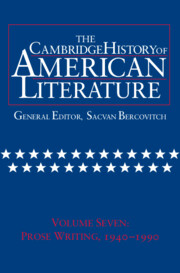Book contents
- Frontmatter
- Introduction
- The Drama, 1940—1990
- 1 Introduction
- 2 Tennessee Williams
- 3 Arthur Miller
- 4 Edward Albee
- 5 Sam Shepard
- 6 David Mamet
- 7 Changing America: A Changing Drama?
- Fiction and Society, 1940–1970
- After the Southern Renascence
- Postmodern Fictions, 1960–1990
- Emergent Literatures
- Appendix: Biographies
- Chronology, 1940–1990
- Bibliography
- Index
6 - David Mamet
from The Drama, 1940—1990
Published online by Cambridge University Press: 28 March 2008
- Frontmatter
- Introduction
- The Drama, 1940—1990
- 1 Introduction
- 2 Tennessee Williams
- 3 Arthur Miller
- 4 Edward Albee
- 5 Sam Shepard
- 6 David Mamet
- 7 Changing America: A Changing Drama?
- Fiction and Society, 1940–1970
- After the Southern Renascence
- Postmodern Fictions, 1960–1990
- Emergent Literatures
- Appendix: Biographies
- Chronology, 1940–1990
- Bibliography
- Index
Summary
David Mamet is no less fascinated by personal and national psychosis than Sam Shepard. His America also is cracking apart. Like Shepard, he is drawn to a male world of encoded violence and stresses the all but unbridgeable gulf between the sexes. He, too, is fascinated by myths that have collapsed into fantasy, finds in Hollywood a paradigm of tainted dreams, and offers bleak portraits of American alienation. Like Shepard, he peoples his stage with urban cowboys and dramatizes the collapse of language in the face of experience. Sexual Perversity in Chicago has something of the brittle energy of The Tooth of Crime; The Woods offers a requiem for love not very different in spirit from Fool for Love. Mamet’s characters, like Shepard’s, inhabit a burned-over land in which the past exists only as buried fragments, echoes of half-forgotten myths. Shepard’s True West, in which two brothers trash their mother’s home, is echoed in Mamet’s American Buffalo, in which a character trashes a junk store. The peep show in Paris, Texas is reminiscent of that in Edmond. There are also clear differences, however.
There is, behind Mamet’s American Buffalo and Glengarry Glen Ross, a consistent critique of American values, of a promise that has become the basis of betrayal, of a spirit of enterprise that has degraded in the direction of crime. History exists and is invoked but has no functional value. Something has disrupted a moral continuity. His America, once invented by a gentleman farmer, is now reinvented by petty criminals (American Buffalo), depressives (Edmond), and confidence tricksters (Glengarry Glen Ross and The Shawl).
- Type
- Chapter
- Information
- The Cambridge History of American Literature , pp. 65 - 75Publisher: Cambridge University PressPrint publication year: 1999

